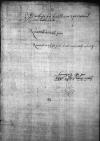Accepimus ⌊⌋ Paternitatis Tuae datas ⌊Lubaviae⌋ 22 mensis praeteriti Maii, quibus scribit iam tandem cum ⌊Costka⌋ sacrae ⌊maiestatis regiae⌋ in ⌊Prussia⌋ thesaurario composita esse omnia seque in gratiam cum eo non modo sermone, verum etiam amico convictu convenisse, quod nobis placet, eo enim animo sacra maiestas regia vel nostra opera Paternitatem Tuam ad eum episcopatum istic evexit, ut hominem sibi et ⌊filio⌋ suo serenissimo regi ⌊reique publicae⌋ illi habeat honori et usui utque maiestatis suae et reipublicae negotia et officiales omnes diligeret, foveret et promoveret, quod specialiter de Paternitate Tua nos etiam haud dubie speravimus.
Scribit praeterea Paternitas Tua non debere reverendissimum dominum ⌊archiepiscopum⌋ coram ⌊maiestate regia⌋ et nobis queri de Paternitate Tua, cum on the margin⌈cumcum on the margin⌉ qua ... antea redierat per litteras in gratiam.
Dominus ⌊archiepiscopus⌋ numquam questus est de Paternitate Tua data opera, sed cum in illis disidiis audiverimus illum nominari, voluimus ab eo scire, quid hac in re scripserit Paternitati Tuae, ille nobis respondit id, quod alibi etiam manibus palpavimus, eum velut pium patrem paterne admonuisse Paternitatem Tuam, quae non vulgarem illius consilii obtinet locum, ut ab allis dissidiis abstineret seque aliter gereret erga officiales et commoda ⌊maiestatis suae⌋ ⌊reique publicae⌋.
Ipsamque Paternitatem Tuam nos quoque hortamur, ut se sic attemperet, quemadmodum ⌊ille⌋ perscripsit. Futurum est ⌊maiestati suae⌋ et nobis gratum atque Paternitati Tuae aliquando non inutile. Quod si secus fecerit, diversum a ⌊maiestate sua⌋ et a nobis experietur.
Bene valeat.
 BNW, BOZ, 2053, TG 17, No 2043, f. 137r
BNW, BOZ, 2053, TG 17, No 2043, f. 137r

